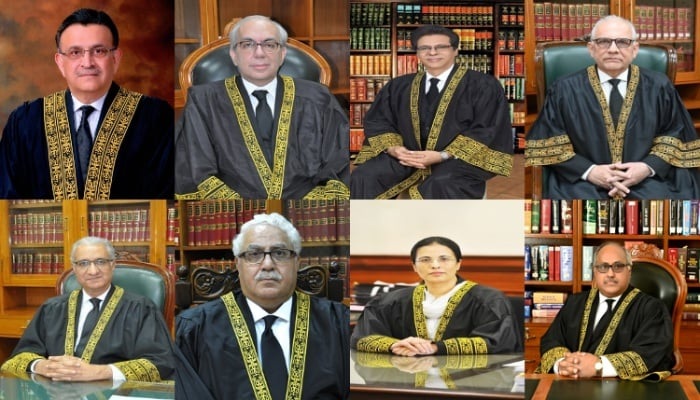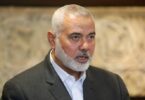ISLAMABAD (Agencies): Chief Justice of Pakistan (CJP) Umar Ata Bandial remarked on Tuesday that the political parties wanted to “pick and choose” the bench for “desired judgments”. The CJP passed the remarks as the Supreme Court resumed hearing on the petitions challenging the law clipping his office’s powers.
An eight-member larger bench of the apex court headed by CJP Umar Ata Bandial and comprising Justice Ijaz ul Ahsan, Justice Munib Akhtar, Justice Sayyed Mazahar Ali Akbar Naqvi, Justice Muhammad Ali Mazhar, Justice Ayesha A Malik, Justice Syed Hasan Azhar Rizvi and Justice Shahid Waheed heard the case. At the outset of the hearing, CJP Bandial remarked that the bench will hear everyone after Attorney General for Pakistan (AGP) Mansoor Usman Awan shared that some parties in the case would like to address the bench via video link.
The top judge observed that important points, including the independence of judiciary, have been pointed out in the case and is “one of a kind”. “Our stay order of the last hearing is in place. Law related to the Supreme Court rules are very clear,” said CJP Bandial. CJP Bandial further stated that the judiciary has “reservations” over the law.
“Democracy is an important part of the Constitution and so is an independent judiciary and the federation,” the chief justice said and wondered whether the component of the judiciary can be changed. The chief justice stressed that independence of the judiciary is a “fundamental right”.
Meanwhile, Pakistan Tehreek-e-Insaf (PTI) lawyer Khawaja Tariq Rahim said that the judicial reform bill has become part of the law. On this point, the court sought record of the debate held in the Parliament and standing committee on judicial reforms. While the chairman of the Executive Committee of the Pakistan Bar Council (PBC) requested the inclusion of senior judges in the bench. The PBC stated that more than six references have been filed against Justice Mazahar Ali Naqvi who is part of the bench.
However, the PBC’s request for the formation of a full court and exclusion of Justice Naqvi was rejected by the court. The Supreme Court also rejected the AGP’s request to withdraw its stay order till April 13. “There is no legal importance of a reference filed against any judge. Until the reference is fixed for hearing, it does not hold any importance,” Justice Bandial said, highlighting that a bench — headed by former chief justice Iftikhar Muhammad Chaudhry — had addressed the issue in a verdict.
“Politics has tainted the judicial process,” the country’s top judge remarked. He maintained that there are also some limitations and restrictions of the federal list with respect to legislative powers. “See section 55 of the Federal Legislative List,” the CJP said. He added that an independent judiciary is a fundamental component of the Constitution and it cannot be changed. “It is alleged that the fundamental part of the Constitution was violated through legislation for the first time in the country’s history,” he remarked. He added that the chief justice has the authority to appoint seven senior judges and form a full court.
Only the president, CJP Bandial said, can file a reference as declared by the court in the Iftikhar Chaudhry case. “A reference against a judge cannot prevent them from working until the opinion of the Supreme Judicial Council,” he said. The CJP said that the court gave the same decision even in the Justice Qazi Faez Isa case and highlighted that he has receives complaints against judges regularly.
“Complaints keep coming against most of the Supreme Court judges including myself,” he added. Criticising political parties for seeking verdicts based on their wishes, the chief justice said: “Political people want decisions of their choice, not justice.” The demand for a full court and removal of judges was also made during the elections delay case. “The decision of the Supreme Court judges is the decision of the court. Every institution is bound to implement the Supreme Court’s orders,” the CJP said. The hearing of the pleas was adjourned by the court till May 8. “We will resume the case on Monday and then review all the issues,” CJP Bandial said. He also directed all parties in the case to submit written arguments in the case.
After having the PBC’s request rejected during the hearing, its lawyer Hassan Raza Pasha apologised to the judiciary in case of any hurt caused. “We are not angry. We will leave [eventually]. PBC will stay here, we won’t,” CJP Bandial said. “A request for formation of a full court was made earlier, but not for the exclusion of judges,” Pasha elaborated.
CJP Bandial asked the PBC counsel to find out what a full court is according to lawyers. Pasha said he has informed the court about lawyers’ concerns. “The Supreme Court bar has to protect the institution,” the chief justice remarked. He said that it should first be understood what the law is and why is it made. “The court should consider expanding the bench,” AGP Awan said. The CJP responded saying that the members of the bench can also be reduced.
“If the judges of the Supreme Court are not respected, then there will be no demand for justice,” the top judge said. He lamented that it was shameful that a request for full court was made in the previous case.
The Supreme Court (Practice and Procedure) Act 2023, which is aimed at regulating the powers of the CJP, was approved by the Parliament during a joint sitting on April 10. The National Assembly, on April 21, notified the Supreme Court (Practice and Procedure) Bill 2023 as an act. The bill’s implementation was halted by the same bench hearing the case today.
The top court, during the last hearing of the case on April 13, had stopped the implementation of the law observing that if the law received the assent of the president, the bill would not be acted upon in any manner till further order. “The moment that the Bill receives the assent of the President or (as the case may be) it is deemed that such assent has been given, then from that very moment onwards and till further orders, the Act that comes into being shall not have, take or be given any effect nor be acted upon in any manner,” read the nine-page interim order issued on April 13. In its order, the bench stated that the facts and circumstances presented here are extraordinary both in import and effect.







